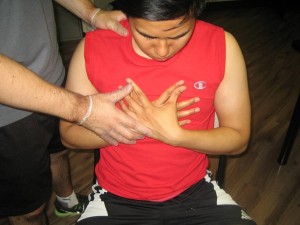Acid reflux occurs once the stomach acid flows up to the esophagus which results to heartburn and a enduring sour taste in the mouth. If the condition is not treated, it can progress into a severe condition called gastroesophageal reflux disease (GERD) which causes wheezing, difficulty swallowing, chest pain and frequent regurgitation of food. Even though over-the-counter and prescription medications can deal with acid reflux, alternative treatment options are available for those who seek a drug-free approach.
Diet
Since the diet often plays a vital role in the development of acid reflux, avoidance of trigger foods can help manage the condition. The reflux-inducing foods include fried or greasy meals, oils, chocolate as well as whole milk, fatty slices of meat, peppermint, spearmint, fast food, tomatoes and cream-based soups.

Those who are suffering from acid reflux must avoid the consumption of these items. In addition, some individuals should avoid spicy foods and reduce the intake of coffee, tea, caffeinated beverages, soft drinks and whole or juiced citrus fruits such as pineapple, grapefruit and orange. Minimizing or avoiding these dietary triggers can provide relief for those who have acid reflux triggered by the diet.
Weight loss
For those who are weighing above the ideal body weight, cutting down excess weight can help manage acid reflux. The extra abdominal fat limits the expansion capacity of a full stomach, resulting to food and acid regurgitation into the esophagus. Those who suffer from acid reflux can find relief from heartburn and other undesirable symptoms by maintaining a healthy weight.
Home remedies
A number of drug-free home remedies can help manage acid reflux. There are simple treatment options for acid reflux which includes the following:
- Swiftly gulping a large glass of water once the symptoms manifest.
- Sugar-free gum can be chewed in order to promote production of saliva and counteract stomach acid.
- Eating a fresh apple before bed time, after meals or at any other time reflux occurs.
- Eating raw vegetables or drinking fresh vegetable juice several times throughout the day, preferably on an empty stomach.
Lifestyle changes
Avoidance of any reflux-causing habits and lifestyle practices can help treat or prevent acid reflux. The life-style related causes include lying down after eating, smoking cigarettes, eating food right after exercise and drinking alcoholic beverages.
The best way to eliminate these risk factors is to maintain an upright position after meals, exercise only on an empty stomach, abstain from alcoholic beverages and stop smoking.
In addition, the individual should avoid wearing tight-fitting clothes that tends to encourage reflux due to the added pressure on the stomach and lower esophagus. Controlling the potential lifestyle causes of acid reflux can help the condition subside without the need for medicated treatments.
Stress
In some cases, daily stress and anxiety can instigate or worsen acid reflux. For those who have reflux connected to tense emotions, it is best to engage in relaxation techniques to cope better with stress. Possible methods include listening to soothing music, aromatherapy, hypnosis, massage, gentle exercise and guided imagery. Those who learn healthy ways to reduce anxiety can experience a reduction of the symptoms as a result.
